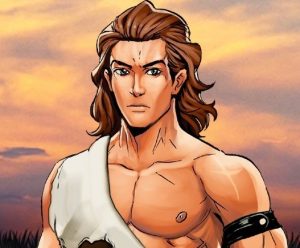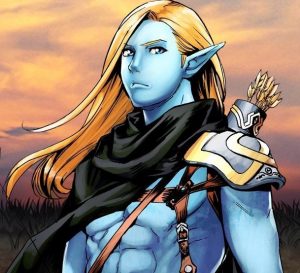
If fantasy fiction was at a party with filled with other narrative concepts, it would spend all night trying to dance up on slavery. Fantasy writing has a love affair with slavery as a narrative device that stretches back ages. In a genre that loves underdogs, it paints slaves as the underdoggiest, and writers continually operate under the illusion that slavery is valuable as a narrative device that doesn’t also require them to grapple with it. It’s like magic, it exists as a facet of the world, rather than requiring he constant effort of sentients to subjugate others.
It bears mentioning that the only character more beloved in those settings than the slave is the heroic slaveholder who turns against what their society believes in to become a hero of the people. There are usually crystals involved, and one or more mystical prophecies. This is the kind of thing we’re dealing with in Loren, the Amazon Princess. A budget visual novel boasting more than two novels worth of content, we’ve been streaming it for thirty hours now. It’s got romance, fireballs, prophecies, amazons, and exactly the engagement with slavery that one would expect.
 A starting point
A starting point
It’s worth being a bit of a moral absolutist, and ducking nuances like wage slavery and debt slavery for the sake of only making this a paragraph long. There is no way to own slaves and be good. If there is a basis for goodness, it necessarily rests on recognizing other people as such, and treating them like property is in direct opposition to that. Going further, there’s no way to participate positively in a culture that owns slaves and be good. The minimum acceptable response is militant abolitionism.
This seems like an easy position to adopt, especially in a genre whose problems are largely solved by the application of fire and swords. Militancy is at the heart of most fantasy heroes, especially in games, where battle is usually one of the payoffs that the game offers. It’s certainly possible to have characters that exist in a civilization that practices slavery, but they aren’t in a position to be unambiguous (or even ambiguous) heroes without staunch opposition to that institution. If they want to save people from dragons but not from their oppressors, then they don’t really value those people’s lives or freedom in any way beyond convenience.
Backdrop
And that’s really what we get to, is the use of slavery as a plot device. Slavery is more than that. It’s a narrative force that shapes the moral character of a culture. If we read “The Amazons keep slaves” that tells us about every Amazon. Their character is now defined by their relationship with the system of oppression that forms the core of their way of life. It’s easy to assert that the game or novel is about something else, but doing so trivializes the moral impact, especially in a genre that deals so readily in good and evil.
In Loren, Amazon Princess, the Amazons (of which Loren is their Princess) keep slaves. The main character spends the game as the princess’s slave, out and about in the world solving a variety of fantasy problems. As the story unfolds, the warring humans and elves are united under the Amazons’ banner in a mighty army pledged to battle the demons of the Everburn, and the Death Knight Fost. Loren leads that army, a heroine chosen by destiny, the wielder of the Ember Blade. And still you are a slave.
 The hero of ages
The hero of ages
The story opens with Loren threatening to kill several slaves because her training dummy is broken, so you can tell she’s hero material. Your character is presented as her personal slave, and travels with her when she leaves to search for her missing mother. When the topic comes up after that, it’s always on a personal level, about whether your character desires freedom, or how they parse their loyalty and continued service to a person who regards them as property. Even when it’s uncovered that Loren’s mother ran fled the position of Queen because she was in love with a slave, neither of them questions the institution of slavery as the foundation of Amazon society.
As you meet the temporal and spiritual leaders of nations, they never bring it up, looking to Amazons for leadership and to settle their differences, even though none of those nations appear to practice slavery. The gods themselves choose Loren as their champion. The wielder of the mystic sword, you know the type. In the world of Aravorn, the gods’ chosen hero keeps slaves. The things that says about the cosmology of that world are thick with implications, especially with the presence of another character who’s trained to be the champion, an exiled man of humble beginnings who, for all his faults, doesn’t treat people as property.
It’s not too much
It seems like a lot to ask that a visual novel I got for twenty bucks, intending to stream it for laughs, engage deeply with the ethics of slavery. But a team of people wrote two novels worth of dialogue for it. It does painstaking worldbuilding and character development, and doesn’t hesitate when talking about the ethics of magic, the cosmology of good and evil, the consequences of ancestral sin, and oppressive societies maintaining diasporas. It deigns to tackle racial tensions, institutional mistrust, diverse spiritualities, and the pain of loss, but barely has one word to say about the fact that the hero becomes the queen of a nation where you can own people.
There are lots of shitty things that get handwaved in fantasy for the sake of the genre. The existence of elemental evil, the convenience of monarchs, the choosiness of magic and the way that wizards do things. But in a genre where the most common conflict is people standing in the way of others who feel entitled to take what they want, slavery can’t be one of them. It’s easy to have a fantasy world without it, so including it means discussing it and addressing its interactions with heroism.




Slavery as plot device is an ancient trope, obviously going as far back as the Bible. In a lot of ways, it’s overdone: Even science fiction, which literally has no need to ever have slavery in the first place because, you know, robots (The “fully-automated luxury gay space communism” narrative is, of course, just as science fictional as Star Wars, but since we’re in science fiction world, unrealistic AI is acceptable.), has slavery.
I don’t think anyone brings up the ethics because, well, quite frankly, everyone knows the only acceptable answer, just as sure as Huckleberry Finn did. We can’t even conceive of a justification for slavery.
amazing